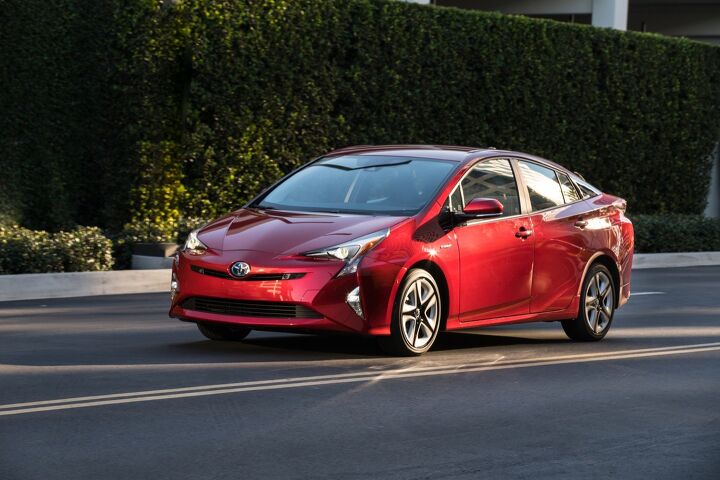A U.S.-launched Trade Dispute Is Helping Toyota in One Key Market, but for How Long?

While the trade situation is still very much in flux, Toyota sees itself as standing to gain from the turmoil, just not in the United States. The automaker, along with other Japanese brands, finds itself in an advantageous position in China — a massive market facing its own troubles.
China’s anger at the U.S., and vice versa, could mean big bucks in the short term for Toyota.
According to the Financial Times, Toyota sees China as a big opportunity, and wants to capitalize on the current trade situation. In early summer, in response to tariffs levelled by the U.S., China slapped new tariffs on top of the ones it already applied to imported American cars. At the same time, it lowered tariffs on vehicles brought in from other countries, including Japan.
Toyota performs much of its manufacturing in Japan, and all of the Lexus-branded vehicle it sells in China arise from its home country. As the tariffs translated into higher prices for many U.S. luxury cars sold in that market, Lexus sales skyrocketed in August. The brand’s Chinese sales rose 59 percent, year over year, last month, setting a new monthly record.
Despite a three-month downturn in Chinese auto sales sparked by the trade tiff, Toyota recorded a 23 percent year-over-year sales increase in August. Compare that to Ford Motor Company’s 36-percent drop.
“It’s inevitable for Toyota to shift to China with a sharp slowdown in the US,” Masahiro Akita, analyst at Credit Suisse, told FT. “It’s also perfect for Toyota since it will help them to maintain their commitment to producing 3m vehicles in Japan.”
Last month, Reuters reported that Toyota planned to boost its Chinese automotive production by 20 percent, or another 240,000 vehicles per year. The automaker has assembly plants in Tianjin and Guangzhou, building 1.16 million vehicles per year. Increased state subsidies for electric vehicles and the country’s promise to relax, then eliminate, rules on foreign ownership has Toyota seeing green.
While much of China’s energy goes into building (and talking up) electric vehicles, it remains interested in hybrid technology — something Toyota knows much about. Sources tell FT that the country wants the maker of the Prius to share its technological prowess in that field.
Of course, there’s many ways this situation can turn sour for Toyota. China’s economy could tank, leaving fewer buyers for Toyota’s vehicles, or the U.S. could levy new tariffs on Japan, throwing its North American operations into chaos. Over the first eight months of 2018, Toyota Motor Corp. sales in the U.S. rose 1 percent, to 1,621,137 vehicles.
[Image: Toyota]

More by Steph Willems
Latest Car Reviews
Read moreLatest Product Reviews
Read moreRecent Comments
- Redapple2 jeffbut they dont want to ... their pick up is 4th behind ford/ram, Toyota. GM has the Best engineers in the world. More truck profit than the other 3. Silverado + Sierra+ Tahoe + Yukon sales = 2x ford total @ $15,000 profit per. Tons o $ to invest in the BEST truck. No. They make crap. Garbage. Evil gm Vampire
- Rishabh Ive actually seen the one unit you mentioned, driving around in gurugram once. And thats why i got curious to know more about how many they sold. Seems like i saw the only one!
- Amy I owned this exact car from 16 until 19 (1990 to 1993) I miss this car immensely and am on the search to own it again, although it looks like my search may be in vane. It was affectionatly dubbed, " The Dragon Wagon," and hauled many a teenager around the city of Charlotte, NC. For me, it was dependable and trustworthy. I was able to do much of the maintenance myself until I was struck by lightning and a month later the battery exploded. My parents did have the entire electrical system redone and he was back to new. I hope to find one in the near future and make it my every day driver. I'm a dreamer.
- Jeff Overall I prefer the 59 GM cars to the 58s because of less chrome but I have a new appreciation of the 58 Cadillac Eldorados after reading this series. I use to not like the 58 Eldorados but I now don't mind them. Overall I prefer the 55-57s GMs over most of the 58-60s GMs. For the most part I like the 61 GMs. Chryslers I like the 57 and 58s. Fords I liked the 55 thru 57s but the 58s and 59s not as much with the exception of Mercury which I for the most part like all those. As the 60s progressed the tail fins started to go away and the amount of chrome was reduced. More understated.
- Theflyersfan Nissan could have the best auto lineup of any carmaker (they don't), but until they improve one major issue, the best cars out there won't matter. That is the dealership experience. Year after year in multiple customer service surveys from groups like JD Power and CR, Nissan frequency scrapes the bottom. Personally, I really like the never seen new Z, but after having several truly awful Nissan dealer experiences, my shadow will never darken a Nissan showroom. I'm painting with broad strokes here, but maybe it is so ingrained in their culture to try to take advantage of people who might not be savvy enough in the buying experience that they by default treat everyone like idiots and saps. All of this has to be frustrating to Nissan HQ as they are improving their lineup but their dealers drag them down.


































Comments
Join the conversation
What I got from this article is that China has Import Taxes, Vats, Displacement Taxes and a Final Sales Tax on imported products. China does this to incentivize manufacturers to produce their products domestically and provides refunds/incentives to export does products from their Chinese factories. And now they have raised does Taxes on imported American Luxury vehicles, and other goods after the USA raised reciprocal VAT's on Chinese made cars, steel, aluminum and other manufactured goods. This simply looks like China wants to keep the status quo, have Foreign markets open to Chinese made goods while keeping their domestic markets closed and and controlled.
STOP THE PRESSES! Toyota has a good month in China. Bravo when TTAC sends a report card home, to be signed by Toyota's parents, there should be a gold star in the China sales row. In other news the Cleavland Browns won their first game in 2 years. Lets talk Superbowl.